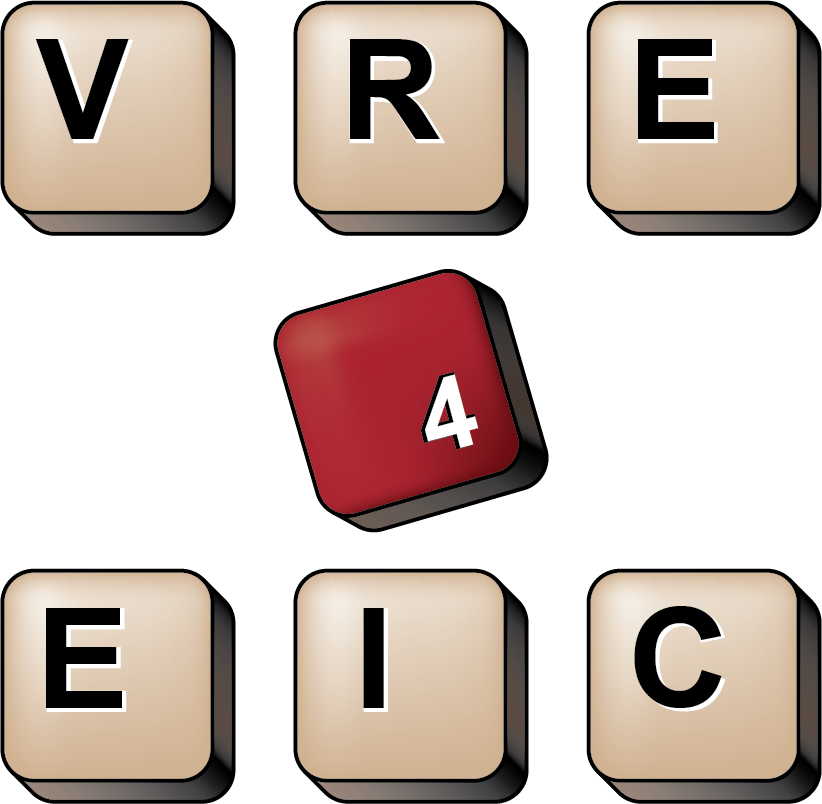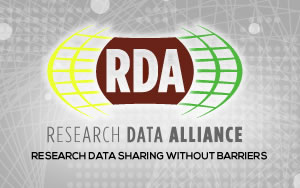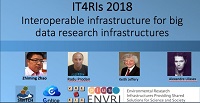Brief Description of the project
VRE4EIC (A Europe-wide Interoperable Virtual Research Environment to Empower  Multidisciplinary Research Communities and Accelerate Innovation and Collaboration) develops a reference architecture and software prototypes (under the name of e-VRE, for enhanced VRE) to be used for future VREs including building blocks that can be used to improve existing VREs. The project addresses the key data and software challenges in supporting multidisciplinary data driven sciences. Multidisciplinary Research Communities and Accelerate Innovation and Collaboration) develops a reference architecture and software prototypes (under the name of e-VRE, for enhanced VRE) to be used for future VREs including building blocks that can be used to improve existing VREs. The project addresses the key data and software challenges in supporting multidisciplinary data driven sciences.
Collaboration with Other Initiatives
 |
VRE4EIC has been busy collaborating with other initiatives: The scientific coordinator has been participating in the VRE Interest Group of RDA (Research Data Alliance), which he is co-chairing with American and Australian colleagues. There has been much discussion of the similarities and differences among VREs, VLs (Virtual Laboratories) and SGs (Science Gateways). At the recent RDA plenary in Berlin (March 21-23), the group discussed a presentation on Science Gateways and also discussed training researchers to use VREs.
The EGU (European Geophysical Union) conference in Vienna (April 8-13) featured a session on VREs: “Virtual Research Environments: creating online collaborative environments to support research in the Earth Sciences and beyond” (co-organised with American Geophysical Union).
The project continues to track other VRE activities - especially those in the cluster with EC funding - including EVER-EST which has some similarities to VRE4EIC but is using the concept of research objects.
|
 |
 |
Achievements so far
The activity on user engagement has proceeded with the organization of additional workshops, as detailed in the next section below.
On the technical side, an important milestone has been achieved, with the internal release of the Common Reference Prototype, which is a full implementation of the Reference Architecture for eVRE devised by the project. The implementation was released internally to support the training and evaluation activity, which will be reported at the end of June in D2.5. The public release of the Common Reference Prototype will take place at the end of June, together with a comprehensive documentation.
Finally, deliverable D5.3 reporting the project strategy to handle security, privacy and trust issues (second version) was published at the end of January 2018. The deliverable discusses the implications for the eVRE end-users, reviewing potential privacy, security and trust issues, discussing current measures adopted in Research Infrastructures to mitigate the ensuing risks and suggesting solutions conforming to standards.
Community engagements activities
In the past few months VRE4EIC has been very active regarding community engagement and the organization of evaluation workshops. Some important events we organized in 2018  include the following: include the following:
• On January 18, 2018 CWI and UvA organized a workshop in the context of IT4RIs 18. Community feedback confirmed that VRE4EIC is addressing the right problems to improve eVRE functionality, but also that many of the core AAAI issues require standardization efforts that make the VRE4EIC project dependent on other projects.
• TU Delft organized a workshop during the internal project meeting in February 2018. Using the online tool Mentimeter, a SWOT analysis was conducted. The workshop showed that the strengths of VRE4EIC mainly concern the modularity, interoperability, reusability and scalability of the VRE building blocks. Identified areas for improvement include the sustainability and security, the development of improved documentation for developers and the provision of source code and the demonstration of concrete scenarios to reduce the complexity of the e-VRE for the users. From this workshop, the project consortium derived several concrete action points.
• In March 2018, the EPOS Implementation Phase Project organised a Validation Workshop in Lisbon. A hackathon meeting was carried on in parallel. It was attended by more than 40 persons, belonging both the IT fields and the scientific fields in the solid Earth Science domain. Contributions from the Thematic Core Services of EPOS were presented, together with presentations of the Integrated Core Services. A discussion session followed the presentations, and it included topics as metadata, AAAI, workflows, metadata mapping, Graphic User Interface (GUI). In order to collect feedback from the users, and evaluate the quality of the topics, an evaluation session was carried out. It emphasized the need of the community for training on specific topics, mostly technical VRE related and also the willingness of reusing solutions developed in other projects or initiatives. Also, an overall need of examples and resources was remarked. In this sense, VRE4EIC has an incredible impact potential in the Virtual Research Environment community.
• In March 2018, euroCRIS organized a workshop at the 8th International Conference on information Society and Technology ICIST 2018. This workshop aimed to elicit and refine the VRE GUI requirements for a searching structured data stored in multidisciplinary VRE. euroCRIS presented basic concepts of VREs, objectives of VRE4EIC project, described basic elements of GUI of eVRE. A demo query was created: search for the persons that are members of some (any) organization units and authors of some publications. Participants confirmed that completely understood the creation of the presented demo query. Thereafter, workshop participants started working with the GUI by conducting several tasks while being observed. The participants raised some issues that the VRE4EIC consortium is currently working on.
• Finally, the VRE4EIC consortium is creating training videos that should help developers and end users to better understand VRE4EIC concepts and how to use the e-VRE. The first video, created by Keith Jeffery, is available here.
VRE4EIC upcoming events and workshops
VRE4EIC will organize many more workshops. Please join us at one of the following events!
• The 19th Annual international conference on Digital Government Research Dg.o 2018 (Delft, Netherlands)
• 14th Conference on Current Research Information Systems CRIS2018 (Umea, Sweden)
• 10th International Workshop on Science Gateways IWSG 2018 (Edinburgh, Scotland)
|






